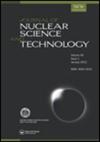Request for 35 Cl(n,p) reaction cross-section measurements and re-evaluations from the standpoint of molten chloride salt fast reactor design
IF 1.7
4区 工程技术
Q2 NUCLEAR SCIENCE & TECHNOLOGY
引用次数: 0
Abstract
ABSTRACTA molten chloride salt fast reactor with inherent safety features is being studied in order to utilize spent fuel discharged from light-water reactors effectively and to reduce environmental burdens. A hard neutron spectrum is required to achieve the transmutation of TRU efficiently, which can be realized by using a molten chloride salt. However, it was found that the criticality analysis shows a large difference of 2%Δk among the effective multiplication factors (keff) obtained using several evaluated nuclear data libraries. A sensitivity analysis was performed to investigate the cause of the difference in keff and it was clarified that the difference of 2%Δk/k reactivity was due to the difference in cross sections of the 35Cl(n,p)35S reaction. Such a large difference in keff makes a reliable core design difficult and strongly affects important core characteristics such as the TRU transmutation rate, conversion ratio, and so on. Therefore, this paper has been prepared to make a strong request for measurements and re-evaluations of the (n,p) cross section of 35Cl.KEYWORDS: Molten salt reactorchloridefast reactortransmutationTRU35Cl(np) reactionDisclaimerAs a service to authors and researchers we are providing this version of an accepted manuscript (AM). Copyediting, typesetting, and review of the resulting proofs will be undertaken on this manuscript before final publication of the Version of Record (VoR). During production and pre-press, errors may be discovered which could affect the content, and all legal disclaimers that apply to the journal relate to these versions also. AcknowledgmentsWe would like to thank Assistant Prof. Chikako Ishizuka at the Tokyo Institute of Technology for her helpful discussions, encouragement and also for computer maintenance to proceed calculations.Fig. 1 Conceptual design for 700-MWt reactor core with four heat exchangers (unit in meters).Display full sizeFig. 2 Bird’s-eye view of the reactor with four loops and a stainless steel reflector.Display full sizeFig. 3 Calculation model of the MCSFR.Display full sizeFig. 4 Average neutron spectrum in the core of the MCSFR.Display full sizeFig. 5 Sensitivities of keff to the reaction cross sections of 35Cl calculated using Serpent 2Display full sizeand ENDF/B-VIII.0.(n,p), (n,α), and (n,γ) cross sections(n,n) and (n,n’) cross sectionsFig. 6 Relative cross-section differences of 35Cl between ENDF/B-VIII.0 and JENDL-5.Display full sizeThe reference of the relative difference is ENDF/B-VIII.0.(n,p), (n,α), and (n,γ) cross sections(n,n) and (n,n’) cross sectionsFig. 7 Contribution of the relative difference in the (n,p) cross sections for 35Cl between ENDF/B-VIII.0 and JENDL-5 to reactivity.Display full sizeThe reference of the relative difference is ENDF/B-VIII.0.Fig. 8 Comparison of nuclear data libraries for the 35Cl (n,p) 35S reaction cross sections with the experimental values. There are three experimental values around 14 MeV: one of Schantl at 14.7 MeV (1970) [Citation21] and the other two of Nagel at 14.6 MeV (1966) [Citation22].Display full sizeFig. 9 Comparison of the 35Cl (n,p) 35S reaction cross sections of JENDL-4.0, JENDL-5, and ENDF/B-VIII.0 with the new experimental data.Display full sizeTable 4 Comparison of effective multiplication factors calculated using the differentnuclear data libraries.TableDownload CSVDisplay Table从熔盐快堆设计的角度要求35cl (n,p)反应截面测量和重新评估
摘要为了有效利用轻水堆排放的乏燃料,减轻环境负担,研究具有固有安全特性的熔融氯盐快堆。为了有效地实现TRU的嬗变,需要硬中子谱,这可以通过使用熔融氯化物盐来实现。然而,在临界分析中发现,不同核数据库得到的有效乘法因子(keff)在2%Δk上存在较大差异。通过敏感性分析探讨了keff差异的原因,并明确了2%Δk/k反应活性的差异是由于35Cl(n,p)35S反应截面的差异。如此大的角差使得可靠的堆芯设计变得困难,并强烈影响堆芯的TRU嬗变率、转化率等重要特性。因此,本文强烈要求对35Cl的(n,p)截面进行测量和重新评价。关键词:熔盐反应器氯化物反应器突变tru35cl (np)反应免责声明作为对作者和研究人员的服务,我们提供此版本的已接受稿件(AM)。在最终出版版本记录(VoR)之前,将对该手稿进行编辑、排版和审查。在制作和印前,可能会发现可能影响内容的错误,所有适用于期刊的法律免责声明也与这些版本有关。我们要感谢东京工业大学的助理教授Chikako Ishizuka,感谢她的有益讨论和鼓励,并感谢计算机维护人员继续进行计算。1 700mwt堆芯4个热交换器概念设计(单位米)。全尺寸显示2鸟瞰图,反应器有四个回路和一个不锈钢反射器。全尺寸显示3 MCSFR的计算模型。全尺寸显示4 MCSFR核心的平均中子能谱。全尺寸显示5使用Serpent 2Display full size和ENDF/B-VIII.0计算keff对35Cl反应截面的灵敏度。(n,p), (n,α)和(n,γ)截面(n,n)和(n,n ')截面。6 ENDF/B-VIII之间35Cl的相对截面差异。0和JENDL-5。相对差值的参考为ENDF/B-VIII.0 (n,p), (n,α), (n,γ)横截面(n,n)和(n,n ')横截面7 ENDF/B-VIII之间35Cl (n,p)截面相对差值的贡献。0和JENDL-5的反应性。相对差值的参考值为ENDF/ b - viii .0。8 35Cl (n,p) 35S反应截面核数据库与实验值的比较。在14mev附近有三个实验值:一个是Schantl在14.7 MeV (1970) [Citation21],另两个是Nagel在14.6 MeV (1966) [Citation22]。全尺寸显示9 JENDL-4.0、JENDL-5和ENDF/B-VIII的35Cl (n,p) 35S反应截面比较。用新的实验数据。表4使用不同核数据库计算的有效倍增因子的比较。表下载CSVDisplay表
本文章由计算机程序翻译,如有差异,请以英文原文为准。
求助全文
约1分钟内获得全文
求助全文
来源期刊

Journal of Nuclear Science and Technology
工程技术-核科学技术
CiteScore
2.40
自引率
16.70%
发文量
116
审稿时长
2.3 months
期刊介绍:
The Journal of Nuclear Science and Technology (JNST) publishes internationally peer-reviewed papers that contribute to the exchange of research, ideas and developments in the field of nuclear science and technology, to contribute peaceful and sustainable development of the World.
JNST ’s broad scope covers a wide range of topics within its subject category, including but are not limited to:
General Issues related to Nuclear Power Utilization: Philosophy and Ethics, Justice and Policy, International Relation, Economical and Sociological Aspects, Environmental Aspects, Education, Documentation and Database, Nuclear Non-Proliferation, Safeguard
Radiation, Accelerator and Beam Technologies: Nuclear Physics, Nuclear Reaction for Engineering, Nuclear Data Measurement and Evaluation, Integral Verification/Validation and Benchmark on Nuclear Data, Radiation Behaviors and Shielding, Radiation Physics, Radiation Detection and Measurement, Accelerator and Beam Technology, Synchrotron Radiation, Medical Reactor and Accelerator, Neutron Source, Neutron Technology
Nuclear Reactor Physics: Reactor Physics Experiments, Reactor Neutronics Design and Evaluation, Reactor Analysis, Neutron Transport Calculation, Reactor Dynamics Experiment, Nuclear Criticality Safety, Fuel Burnup and Nuclear Transmutation,
Reactor Instrumentation and Control, Human-Machine System: Reactor Instrumentation and Control System, Human Factor, Control Room and Operator Interface Design, Remote Control, Robotics, Image Processing
Thermal Hydraulics: Thermal Hydraulic Experiment and Analysis, Thermal Hydraulic Design, Thermal Hydraulics of Single/Two/Multi Phase Flow, Interactive Phenomena with Fluid, Measurement Technology...etc.
 求助内容:
求助内容: 应助结果提醒方式:
应助结果提醒方式:


